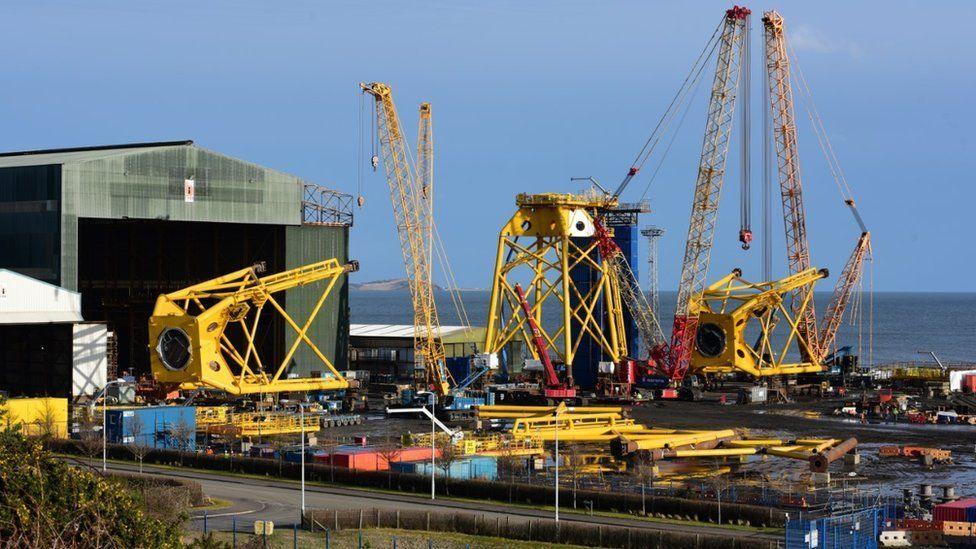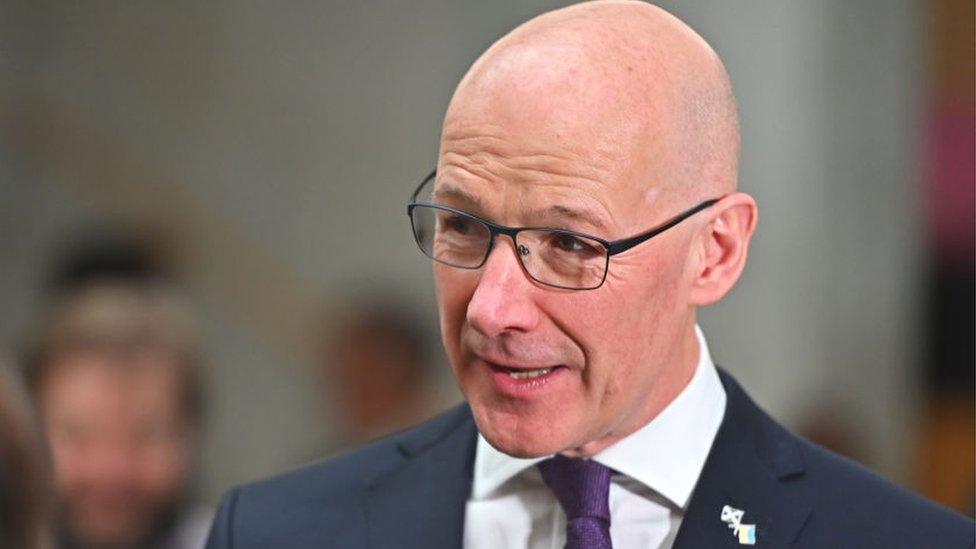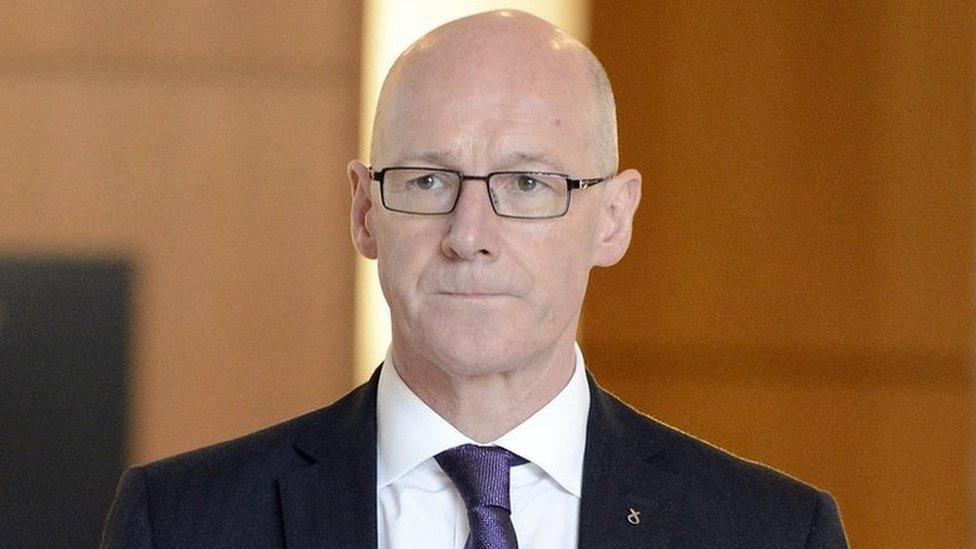Holyrood’s budget watchdog growls
- Published

An underspend of £2bn is the least of the problems raised with Scottish government accounts for last year
The auditor general has drawn attention to some big bills for things going wrong - not least £60m to settle a claim of wrongful prosecution
He's particularly keen to see more transparency and a broader set of accounts that set out all risks and liabilities, including those failing companies that ministers have taken on.
To underspend by £1bn is unfortunate. To do so by £2bn looks like carelessness.
Or so Oscar Wilde might have said if he were commenting on the Scottish government's accounts for last year.
But this wasn't his dramatic dialogue to write. The auditor general was commenting, however, and Stephen Boyle's assessment of the underspend on a £51bn budget was not as harsh as some of the government's critics.
About 40% of that was due to money allocated to student loans but not drawn down.
A large share of it was due to funds being allocated but not spent on business support grants to help them through Covid, or those grants you could get if financially losing out due to self-isolation. The total budget for handling the pandemic last year came to £5.8bn.
It's perverse to criticise government for not paying out money that wasn't needed. At worst, it was a failure of budget planning rather than budget spending.
The financial year 2020-21 was a second exceptional period of extra funds pouring into the budget to tackle the pandemic, and some fast manoeuvring to spend it effectively.

The auditor general had other issues in his sights, with his comment on the accounts which were published on Thursday. And he highlighted some startling figures where policy had gone badly wrong.
Remember that spat with the European Commission, which began in 2019, with the Scottish government accused of failing to fit with the rules for spending the European Social Fund?
It reached the point where the Scottish government gave up trying to defend its position. So it has written off £43m.
Remember the civil case of malicious prosecution brought against the Crown Office for its handling of the controversial administration of Rangers football club? That has so far cost the government £60m.
That's right. Sixty million pounds. It won't take you long to think how that might have been better spent.
Devolved benefits
The Scottish government now controls some welfare benefits, most of which are administered through Whitehall's Department of Work and Pensions. An estimate of overpayments of these devolved benefits comes to £67.5m.
There is no estimate of the overpayment of welfare benefits by the new Social Security Scotland agency. Mr Boyle says there should be, as administration is transferred.
Then there are those investments the Scottish government made in trying to shore up troubled firms deemed to be of strategic significance.
Prestwick Airport is of strategic significance, at least as a fuelling stop for military flights between the US and points east of here. It was taken over by the Scottish government nine years ago, and for several years turned in sizeable losses.

Prestwick Airport is turning over a modest profit these days
While not much of a passenger airport, it's turning a modest profit these days. But the accounts show that the cost of keeping it open has passed the £50m mark, including £7m of interest on loans that will never be repaid.
There was the controversial deal in 2016 with Sanjeev Gupta's complex web of companies that took over steel and aluminium works in Scotland. The 25-year agreement to guarantee payments for production of energy from the Lochaber hydro scheme that feeds the aluminium smelter near Fort William carries a very high potential cost.
That liability means a provision of £114m is made in the accounts. The potential cost per year is up to £32m.
There was the loss on the BiFab fabrication plant in Fife, which meant a £37m write-off in previous years' accounts. And there was the notorious cost of the Cal-Mac ferries being built in the government-owned Ferguson shipyard in Port Glasgow.

The loss on the BiFab fabrication plant in Fife meant a £37m write-off in previous years' accounts
During the 2021-22 financial year, the government wrote off a further £52m to keep the yard open and to help get the ships finished. The total cost is heading north of £250m, when the original contract was for £97m. By last March, the two ships were valued at only £78m.
In comments on previous accounts, Stephen Boyle told the Scottish government that it needed a framework with which to judge the risk tolerance and risk appetite in taking on such companies, particularly because of the lack of flexibility in the budget.
Such guidelines have been drawn up. The auditor general would like them to be clearer about risk, and to have less flexibility for ministers to get round them.
Tight squeezes ahead
His main concerns are of the type that auditors can be expected to care about more than most, but they matter for all of us, as government budgets head into some very tight squeezes.
The accounts that are published don't cover the Scottish government's agencies. They're not clear about some of its liabilities, including those companies it has taken over.
So Mr Boyle is particularly keen to see comprehensive whole-of-government accounts. These were promised in 2016, but six years later, they still have not been produced.
He wants to see more transparency in capital borrowing and in the way the Scottish government flexes its finances. He is not the only one to notice how extra millions can be found down the back of the St Andrew's House sofa, and he wants MSPs, in scrutinising budgets, to be given a better idea of how that is done.
Workforce plan
The auditor general is calling for a comprehensive workforce plan, warning that tight budgets can take a mental health toll on civil servants.
And he is concerned about the governance of government. There's been change at the top, but he warns of unnecessary duplication and inefficiency in handling decision-making.
Much of this is going to become all the more relevant in less than two weeks when John Swinney, as acting finance secretary, sets out his draft budget for the next financial year.

John Swinney is preparing to set out his draft budget later this month
And in emphasising the need for a fuller picture of the whole of government's spending, risks and liabilities, Stephen Boyle doesn't hold back in arguing that the need for it has never been greater:
"The consequences of the pandemic, challenging global economic conditions, the cost of living crisis together with existing pressures in public services all pose significant risks to the sustainability of Scotland's public finances," says his report.
A fuller set of accounts will be "important for decision-making over the longer term as it will provide information about the impact of past decisions on future budgets, the potential risk to financial sustainability, the scale of assets and liabilities and the opportunity to re-think how public finances are managed as the Scottish government seeks to deliver public service reform".
It's worth dwelling a while over the words "the opportunity to re-think how public finances are managed".
'Extremely challenging time'
In response to the audit report, Mr Swinney emphasised the careful management required to avoid an overspend, the upheaval of the pandemic and "an extremely challenging time for the public sector".
The deputy first minister also pointed to the auditor general's recognition of a strengthened focus on longer-term financial planning.
"The Scottish government is committed to producing additional accounts and the auditor general's report recognises the steps we have taken," Mr Swinney said.
"Progress has been slower than planned as we prioritised work on tackling the current exceptional financial challenges."
So the Scottish government says it is committed to improved transparency. Its watchdog wants to see that made clear.
- Published6 October 2022
